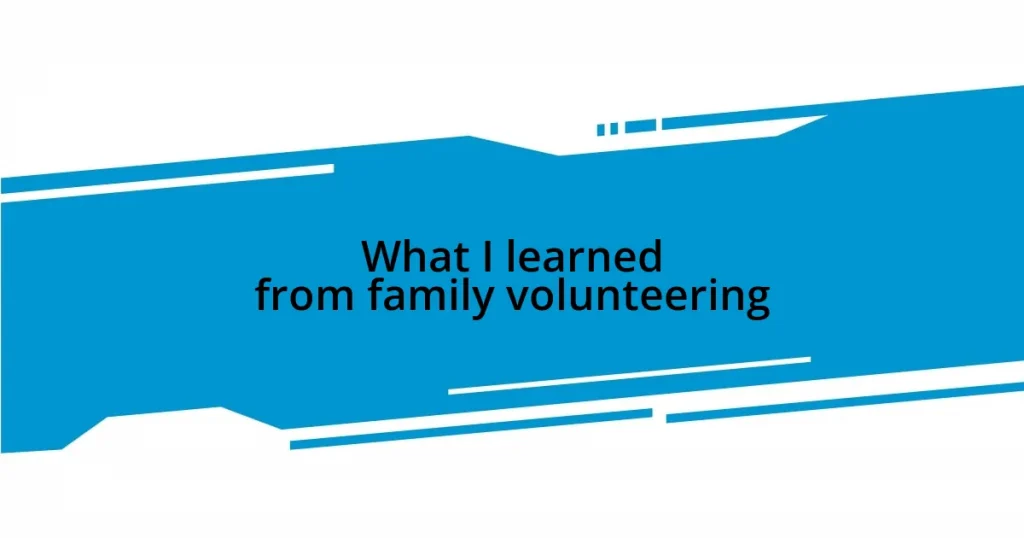Key takeaways:
- Family volunteering strengthens bonds through shared experiences, enhancing relationships and building empathy.
- Engaging in meaningful activities that resonate with family interests fosters deeper connections and encourages open conversations about social issues.
- Involving children in volunteering nurtures their sense of purpose, allowing them to develop compassion and understand community roles.
- Volunteering together promotes teamwork and resilience, turning challenges into memorable experiences that shape family dynamics.
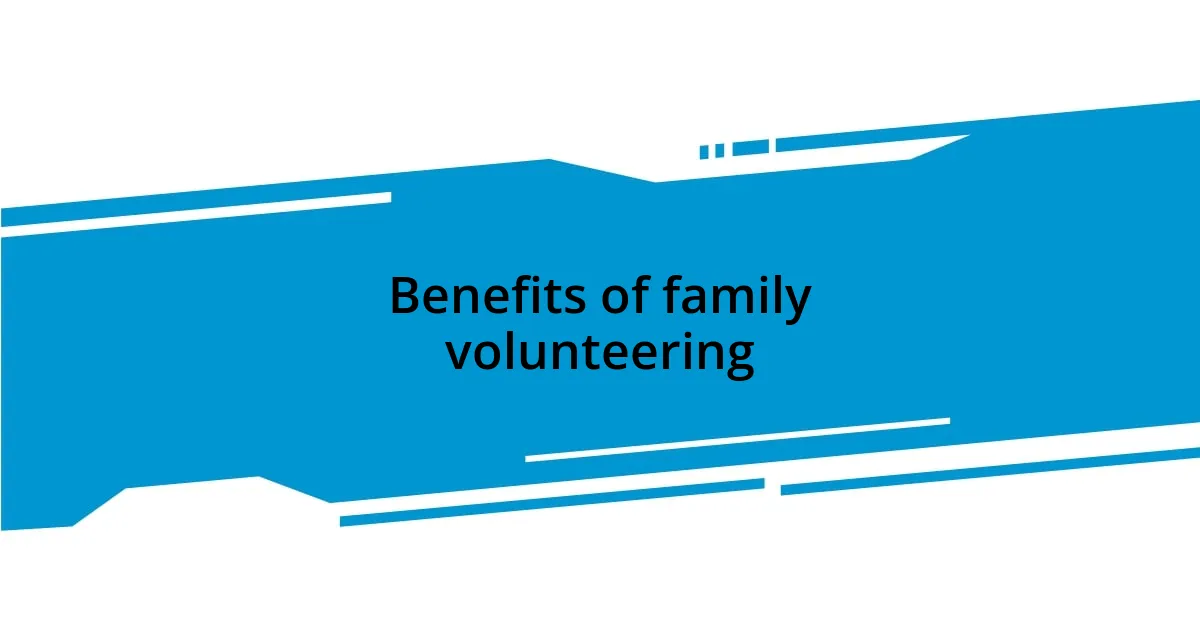
Benefits of family volunteering
One of the standout benefits of family volunteering is the opportunity it creates for bonding. I remember one Saturday when my kids and I spent the day at a local soup kitchen. It was messy and chaotic, but as we chopped vegetables and served meals, I noticed laughter and teamwork blossoming among us. Has there ever been a moment where you felt that strong connection with your loved ones? Volunteering can ignite shared experiences that deepen family ties.
In addition to strengthening relationships, family volunteering opens the door to teaching valuable life lessons. I often reflect on how my daughter learned empathy when we helped sort donations for homeless children. Watching her face as she discovered how different their lives were from ours was incredibly poignant. How often do we get a chance to instill such understanding in our children? Volunteering becomes a bridge to conversations about compassion and gratitude.
Moreover, engaging in volunteer work as a family can nurture a sense of purpose and fulfillment. I’ve felt an incredible sense of accomplishment after working on community clean-up days, and it’s something my family still talks about. It raises the question: what legacy do we want to leave for our children? By volunteering together, we show them that giving back is not just an action; it’s a way of living.
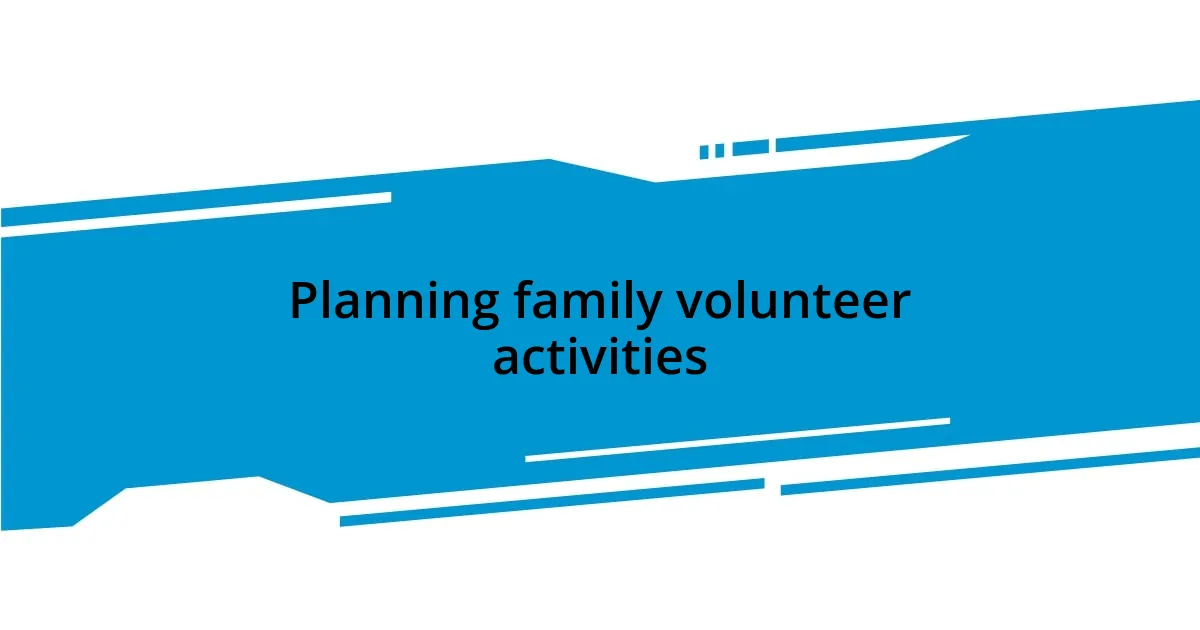
Planning family volunteer activities
Planning family volunteer activities requires thoughtful consideration to ensure that everyone is engaged and that the experience is meaningful. I recall when we decided to clean up a local park; my kids were initially indifferent. However, once we got out there with trash bags and gloves, we turned it into a game, seeing who could collect the most litter. It transformed the event into something fun and memorable.
Choosing the right activity is crucial. Not every family enjoys the same type of volunteer work. Some might thrive in hands-on roles like gardening at a community center, while others may find joy in less active tasks such as organizing books at a library. Personally, when we tried cooking together for a food drive, I realized how much everyone cherished different aspects of the work. My son loved chopping vegetables, while my daughter was more about the presentation of the finished meal.
It’s also important to consider the time commitment and location. I once planned a weekend volunteering opportunity which was too far from home, and it became a stressful experience for everyone. After that, we made it a rule to choose projects that were both meaningful and conveniently located. When you incorporate these elements, family volunteering becomes something everyone looks forward to, rather than a chore.
| Activity | Engagement Level |
|---|---|
| Park clean-up | High – Fun and competitive |
| Food drive cooking | Medium – Collaborative with varied roles |
| Library organizing | Low – Quiet and focused |
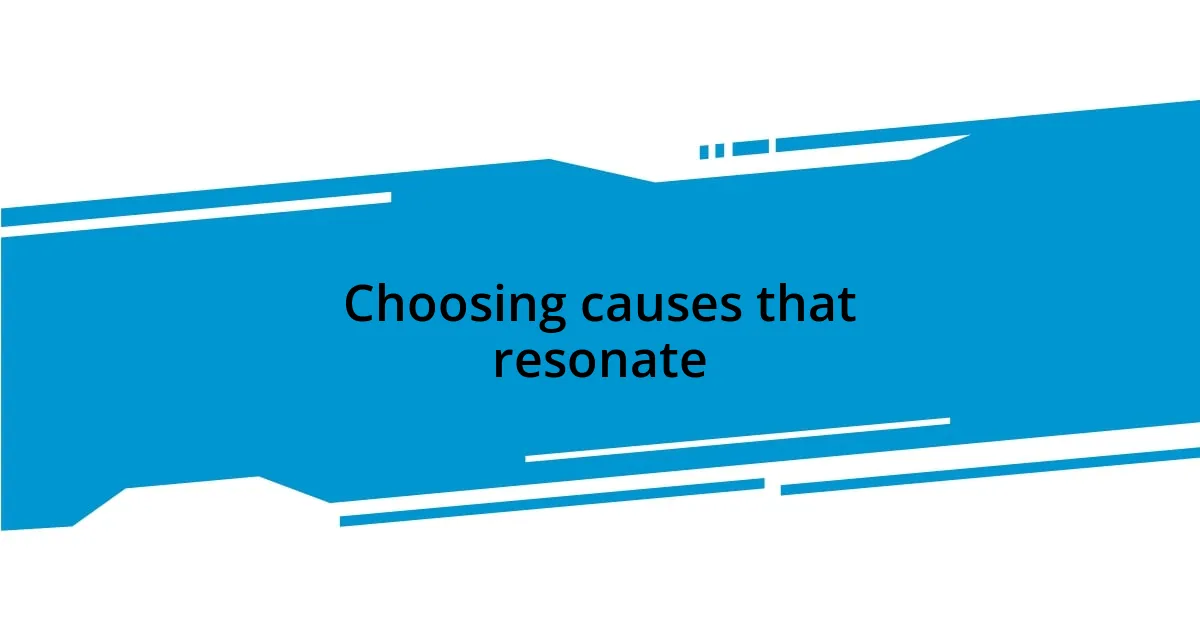
Choosing causes that resonate
Choosing causes that resonate is an essential part of the family volunteering experience. I remember the time we chose to support an animal shelter—animals have always held a special place in my family’s heart. As we walked through the shelter, my kids’ eyes widened with excitement. They instantly connected with the furry residents, and that emotional connection transformed our volunteering day into a joyful adventure. It wasn’t just about helping; we were advocating for something we all cared about deeply.
When selecting a cause that resonates, I’ve learned to listen to each family’s voice. Here are some considerations that have guided us in the past:
- Shared Interests: Identify what causes your family is passionate about. Whether it’s the environment, animals, or supporting the less fortunate, shared interests lead to deeper engagement.
- Emotional Connection: Reflect on what issues evoke strong feelings in your family members. Volunteering for causes that touch your hearts can be profoundly fulfilling.
- Community Impact: Consider local projects that align with your family’s values. Making a tangible difference in your community can strengthen your connection to the cause and to one another.
- Flexibility: Be open to exploring new causes that may speak to family members unexpectedly. Sometimes, the unplanned experiences are the most rewarding.
By carefully considering these aspects, you can create lasting memories and understandings that resonate beyond the volunteering itself.
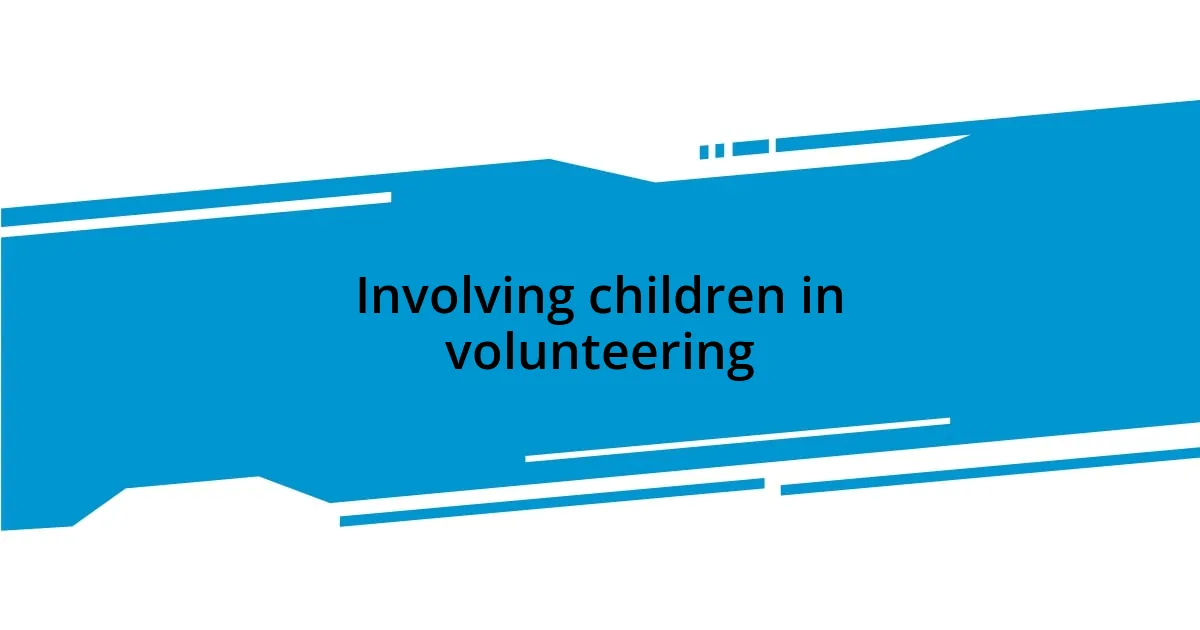
Involving children in volunteering
Involving children in volunteering can give them a sense of purpose and allow them to develop empathy from a young age. I remember we volunteered at a soup kitchen where my daughter, who was around eight at the time, took it upon herself to hand out food with a huge smile. Seeing her excitement and how proud she felt made me realize that kids can understand the value of helping others even if they’re just starting to grasp the bigger picture. Isn’t it fascinating how a simple act of kindness can have such a profound effect on their outlook?
When I let my son choose his volunteering activity, he surprised me with his choice of reading to younger children at a local library. Watching him engage with those little ones, gleefully sharing stories, opened my eyes to the magic of letting kids lead the way. It made me wonder—how often do we underestimate their desires to contribute positively to society? Through this experience, he discovered not only his love for storytelling but also the joy of nurturing connections, which left both of us feeling fulfilled.
I’ve noticed that volunteering as a family creates a unique bond and reflects shared values in tangible ways. A few months ago, we worked together at a community garden, planting seeds while sharing laughs under the sun. It struck me how these moments become threads in the fabric of our family history. Have you ever thought about how such memories can shape the way children perceive their role in the community? By involving them actively, we’re cultivating not just a garden, but also future generations of compassionate individuals.
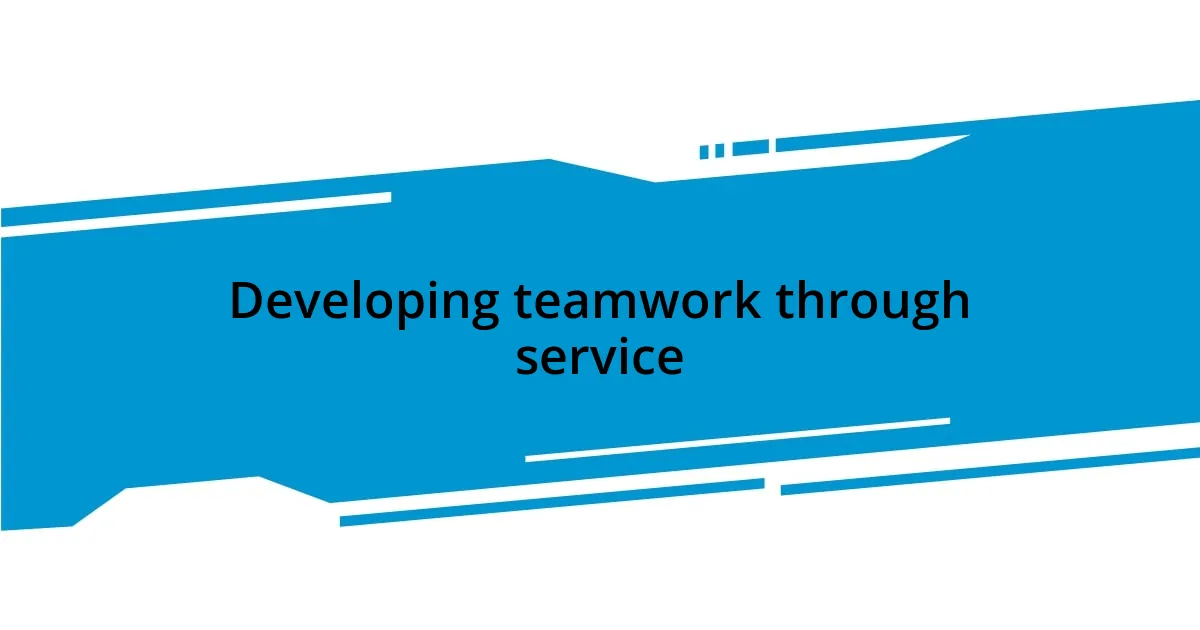
Developing teamwork through service
Volunteering as a family teaches us the power of collaboration. I recall a day when we teamed up with neighbors to clean up a local park. At first, the kids were hesitant, but as we worked side by side, we discovered new ways to communicate and support each other. It was incredible to witness how our individual strengths came together to create a more vibrant space. Have you ever noticed how teamwork can transform a mundane task into an enjoyable experience?
Working with family also fosters trust and respect. One time, we organized a food drive, and my teenager took the lead on promoting it through social media. I was amazed by how much responsibility he accepted—and how he inspired others to join us. That experience gave him a sense of ownership and made us all appreciate the unique contributions each family member brings. Don’t you think empowering one another can help build lasting connections?
Lastly, navigating challenges together during service strengthens our bond. I remember a rainy day when we were meant to distribute supplies at a shelter. Instead of canceling, we adjusted our plans, brought the items indoors, and turned it into a fun distributing assembly line. It was messy but filled with laughter! These experiences remind me of the resilience we build as a family. How often do we reflect on the lessons learned as we face obstacles together while helping others?
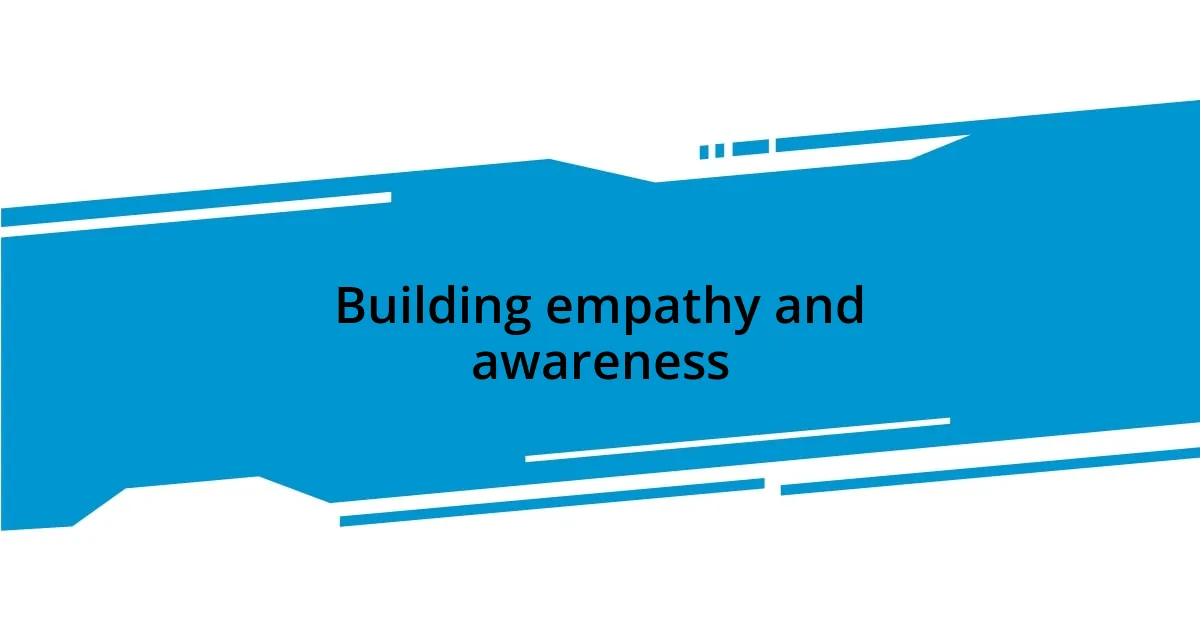
Building empathy and awareness
When my family and I volunteered at a local animal shelter, I noticed my children’s reactions as they interacted with the animals. Their concern for those pets looking for homes was both heartwarming and eye-opening. It made me realize that witnessing the struggles of others, even in different forms, can ignite compassion. Have you ever observed how a moment shared with those in need—whether human or animal—can stir feelings of empathy deep within us?
I also remember a community cleanup event where we picked up litter along a beautiful beach. As we collected discarded items, I saw my kids’ expressions shift from playful excitement to deep reflection about our environment and the importance of caring for our planet. It was like a light bulb went off in their minds. Isn’t it incredible how volunteering can expand our awareness of the challenges facing our world?
In another memorable instance, we spent time serving meals at a local shelter. It struck me how engaging directly with those experiencing hardship helped my children grasp the complexities behind each story. Each person they met had a unique background and struggles, transforming abstract concepts of poverty into real-life experiences. I reflected on how these interactions not only fostered empathy but also encouraged meaningful conversations within our family about gratitude and privilege. Have you found that these kinds of discussions can reshape the way we view our own lives?
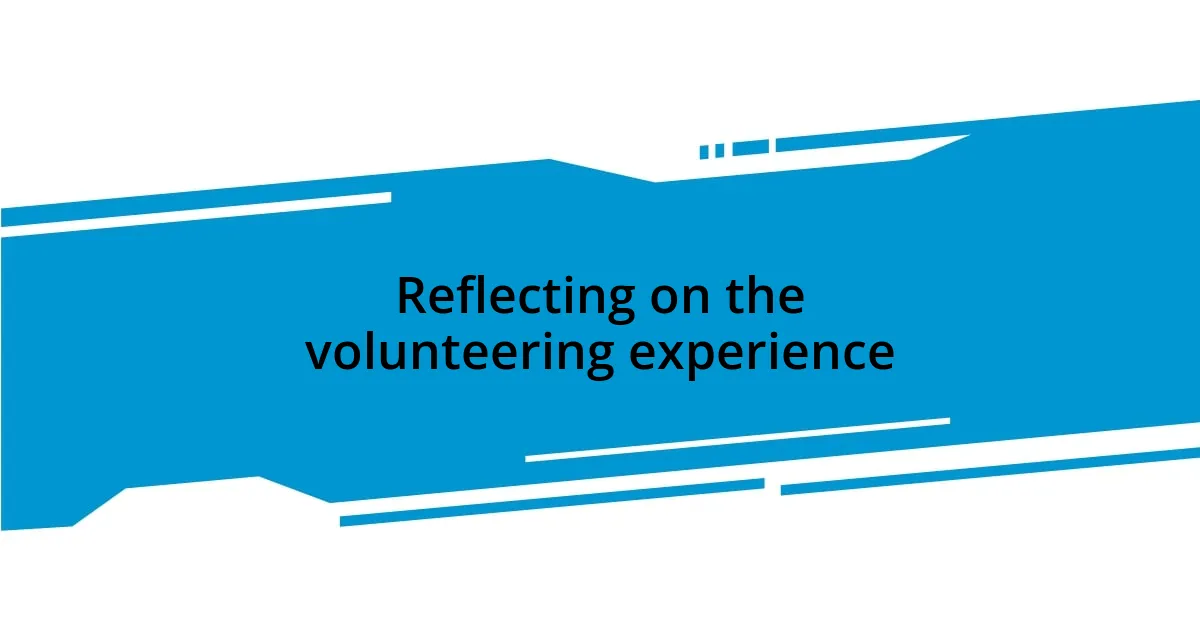
Reflecting on the volunteering experience
Reflecting on those volunteering experiences, I often find myself savoring the moments when our family really connected with those we served. There was a time, while helping out at a soup kitchen, I noticed how my youngest child, who was usually shy, began chatting with a woman waiting for her meal. The genuine smile on the woman’s face transformed the atmosphere—it was a simple yet powerful reminder of the human connection that volunteering fosters. How many times do we underestimate the impact a kind word can have?
I can’t help but think about the emotional footprint these experiences leave on us. After an afternoon of assembling care packages for the homeless, the kids were buzzing with excitement. But as we drove home, their chatter shifted to deeper reflections on the lives we had touched. Their questions were heartfelt: “Why do some people have to struggle like this?” These conversations laid the groundwork for understanding and compassion—hasn’t a simple act of giving often led to profound discussions within your own family?
In my own journey, the act of volunteering has often served as a mirror for my values. One pivotal experience was volunteering at a community gardening project. As I dug in the dirt with my family, surrounded by laughter and shared efforts, I realized that it wasn’t just about growing food; it was about cultivating relationships and community spirit. At that moment, I sensed a shift within us, where our shared purpose became clear. How could anyone not feel enriched by such a rewarding endeavor?











